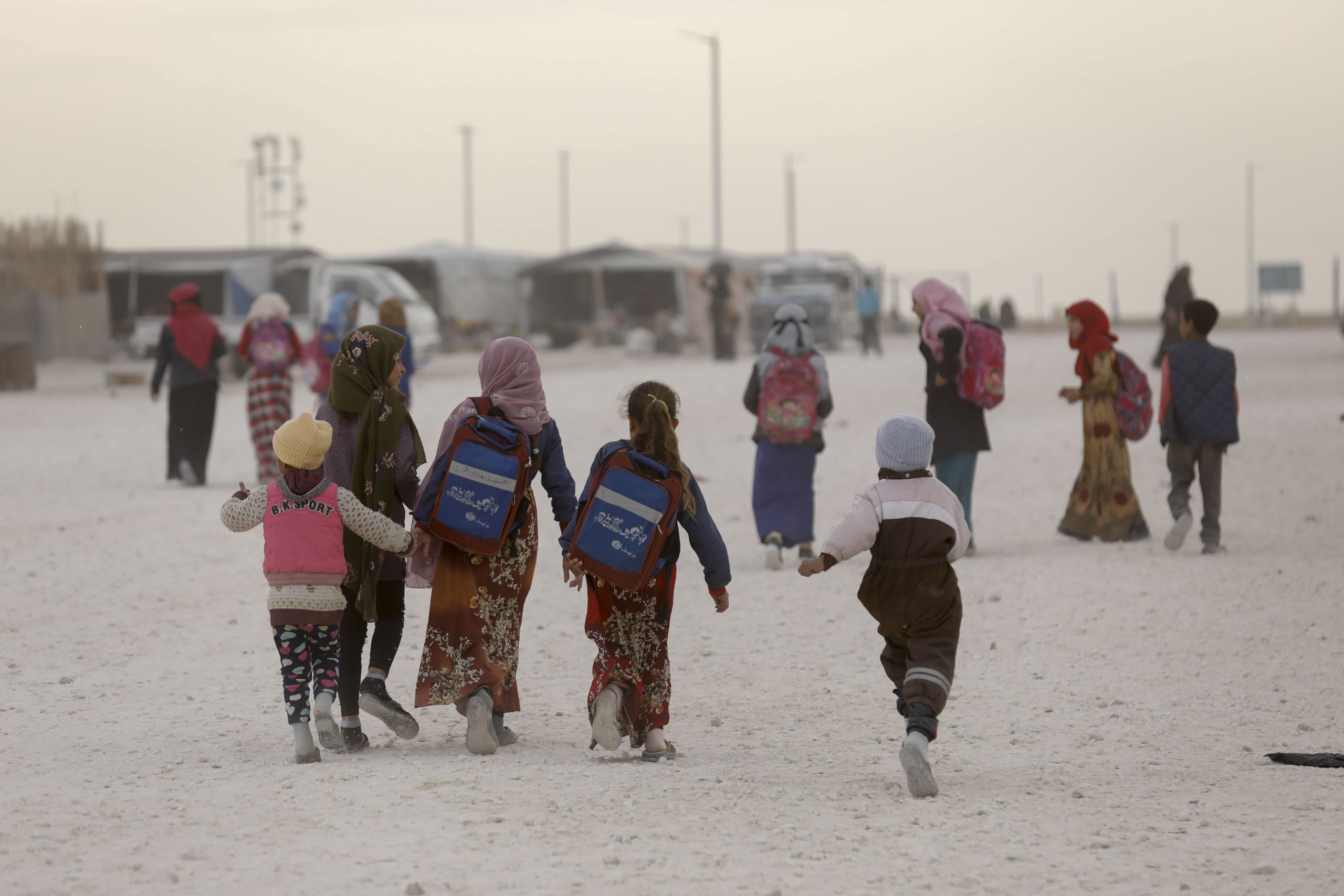-

Andrew Geddes
Full-time Professor
Robert Schuman Centre for Advanced Studies
Director
Migration Policy Centre

Read more
Blog, Rights, protection and inclusion
Children in Boko Haram: Exploitation? Agency? Both?
In the heartland of Northeastern Nigeria, a violent conflict rages on. This strife, a clash between the Nigerian government and the insurgent group Boko Haram, has wreaked untold havoc and instigated displacement of over...
In 2022, more than 100 million people were forcibly displaced; most recent reports estimate that at least 37 million of this critically vulnerable population are children and youth. Children and youth are increasingly moving as a result of local violence or disaster, without parents and guardians, and through countries where they risk being exposed to smuggling, detention and family separation. Left unaddressed, the disruptions that children experience on their migration journeys can lead to cumulative disadvantages and at the point of repatriation or resettlement, it may be too late to intervene.
While children’s mobility is likely only to grow with increases in crises-induced displacement, research and evidence on solutions on how to protect, support, and partner with child migrants throughout the entirety of their migration journey is significantly understudied.
In March 2023, leading experts on child protection and migration joined together at the European University Institute to tackle the questions of: why evidence is lacking and how collaboration could help fill key evidence gaps. By working together, respective strengths and expertise can be mobilized to enhance the collection and analysis of data, develop appropriate interventions, and advocate for policies that protect and promote the rights of children who are displaced or migrate.
The ultimate objective is clear: we need to produce actionable insights for improving practice to help ensure that migrant children have the security, wellbeing, and opportunities to grow and develop to their full potential.
Opportunities to advance knowledge and practice
The workshop was convened by UNICEF Innocenti – Global Office of Research and Foresight (Innocenti), the Migration Policy Centre (MPC), the International Rescue Committee (IRC) and the Global Policy Center (GPC) at the University of Virginia. Additional participants joined from organizations including the World Bank-UNHCR Joint Displacement Hub (JDC), the International Data Alliance on Forced Displacement (IDAC), Save the Children, and Peloria Insights.
The workshop highlighted clear synergies and priorities in advancing evidence. There was a collective call for greater research on cross border migration, longer-term perspective on durable solutions, and the need for longitudinal data and research.
- Rethinking migration through a child and family lens: Research shared from all agencies underscored the unique perspectives of children, young people, and their families who engage in migration and how these perspectives can challenge assumptions. Participants were unanimous in emphasizing the importance of primary data collection of children’s own voices and to the greatest degree possible their own participation in the creation, communication, and use of evidence.
- Holistic perspective on migration as a journey: Research and evidence on effective solutions and protections are needed across the different stages of migration and across the life course of the child. Migration frameworks and solutions that place children at the center need to be developed, especially in emerging contexts of priority such as climate change.
- Leveraging emerging technology in predictive analytics: Predicative analytics and modeling offer an important opportunity to inform new directions in data-driven, social science research on migration and displacement. These efforts would require necessary data quality improvement and coordination in the sector but would offer new possibilities for anticipatory analysis on emerging and future trends in child migration and displacement.
- Values-based communication: In addition to generating evidence, there is a need to understand the political context and public attitudes into which evidence is disseminated. Politicians, policymakers, and the public need evidence: Politicians – who make decisions that influence everyday lives of migrants and need rapid and sharp evidence to inform them; Policy-makers – who need evidence of technical solutions that are effective and efficient in terms of both costs and results; and the Public – whose perceptions and opinions can shape the direction of policies and actions on the ground. But research is needed to understand how that evidence is communicated.
Joining together
Over the course of two, days, participants explored three domains with a focus on knowledge sharing, prioritization and identifying opportunities for further action:
- Mapping evidence gaps and opportunities: Moderated by Josiah Kaplan (Innocenti), this panel featured a Q&A between Jan Beise (UNICEF), Domenico Tabasso (JDC) and Estrella Lajolm (IDAC) on the identification of knowledge gaps and political silos impeding greater collaboration in data sharing across the aid sector and insights in advancing data-driven understanding of child mobility. Christopher Mahoney (Peloria Insights) then offered a case study of social-science informed data analytics, drawing from examples from Peloria Insight’s proprietary predictive analytics model and recent work on climate-induced displacement.
- Children on the Move: Origins, Transit Countries, Destinations: Moderated by David Leblang (GPC), in this session panelists drew on a wide array of contexts and countries to describe conditions for children. Lucy Hovil (UNICEF) drew on interview data with children from Ethiopia, Somalia, and Sudan, Bogdan Krasic (Save the Children) focused on the experience of children moving through the Balkans, while Elena Caracciola (IRC) analyzed surveys of children in transit through Italy. William Low (Save the Children) discussed statistical and machine learning approaches to analyzing big data.
- Durable solutions for children: Moderated by Micol Alberizzi (IRC), this panel explored to what extent durable solutions are child-focused and take into consideration the best interests of the child. Zeudi Liew (UNICEF), Luigi Achilli (MPC), and Martha Roussou (IRC) discussed their research on the realities of return and reintegration for children in Afghanistan, children fleeing the Syrian war and durable solutions for unaccompanied children in Greece.
Next steps: Evidence collaboration is the way forward
In just two days, participants agreed on a number of key data and research priorities between their respective organizations, identified common knowledge gaps in the wider child migration and displacement knowledge space, and agreed to continue close engagement around potential opportunities to seek co-funding.
The synergies were striking, suggesting the need for and value of greater coordination and collaboration to maximize research investments and to ensure collective actions to support greater uptake of evidence. Participants closed with expressions of strong commitment to continuing collaborative dialogue, knowledge sharing, and exploring further opportunities for co-development of future evidence priorities.
While this gathering was only a first step, it offered an opportunity to bring together researchers working in both academic settings as well as those embedded within international organisations who are building into, as well as gathering evidence from policies, programmes and practice, to identify emerging lessons as well as remaining challenges where evidence needs to be more strongly focused.
Learn more:
- a comprehensive review of UNICEF’s child migration and displacement research
- values-based communication
- reimagining migration responses for children
- durable solutions for unaccompanied children
- supporting refugee children in Greece
- poverty, climate change, and family migration
About the authors*
This post was authored by Ramya Subrahmanian, Chief of Child and Adolescent Rights and Empowerment (CARE) at UNICEF Innocenti and Andrew Geddes, Professor of Migration Studies and the Director of the Migration Policy Centre at the European University Institute, with contributions from:
- Josiah Kaplan, Child Protection Specialist at UNICEF Innocenti
- David Leblang, Professor Professor of Public Policy at University of Virginia’s Batten School for Leadership and Public Policy and director of the Global Policy Center
- Micol Alberizzi, Child Protection Technical Advisor at the International Rescue Committee, and
- Stephanie Acker, Research Associate at the Migration Policy Centre.
Image
Courtesy of UNICEF. Adolescent girls leave a UNICEF -supported learning centre after their self-learning classes in Mahmoudli camp, Ar-Raqqa, northeast Syria, on 15 December 2021. They have, together with more than 8,000 people, sought shelter there.

